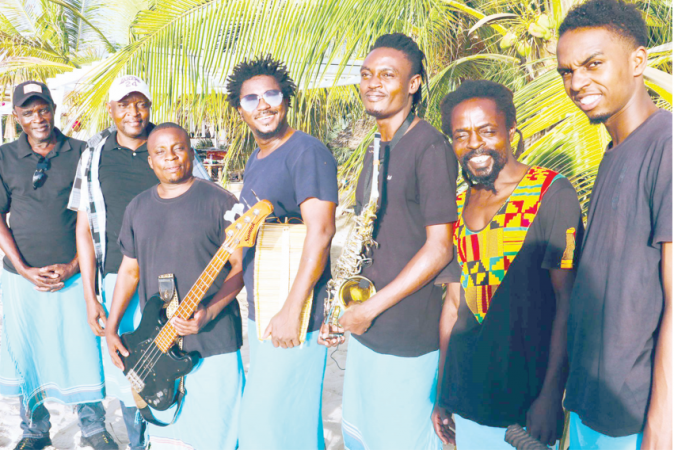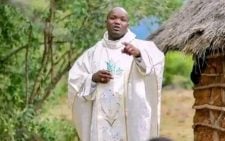Coastal artiste makes soulful music with tinge of Mijikenda sound

While Nairobi is considered a musical hub, hosting some of the most popular artistes in the world, the coastal side of the country still stands as one of the strongest when it comes to cultural heritage. While bongo music has gotten a lot of airplay, genres such as Bango still remain highly popular, especially live performances.
Through time, the younger Mijikenda artistes have learned to fuse some of these popular tunes with the traditional Mijikenda beats popularly known as Mwanzele into a modern Generation Z vibe. Among the artists currently serving good music in the region include the renowned Katoi Wa Tabaka, who has sent Mijikenda jazz and Kaya hip-hop across the globe.
Katoi’s music aims at exploring, explaining, preserving and expanding culture and heritage by voicing real issues that touch the lives of ordinary people in Kenya.
Young creative
Being the last born son in a family that practised farming, his role was to look after the family goats with other boys of his age in the plains and valleys of Marafa, in Kilifi county. Even at that tender age, musical sparks had already started forming in his heart. Together with the other boys, they would create all kinds of crude instruments; from one-stringed bow guitars they used to call kadama to whistling the kipopoi and milozi and sometimes flutes. Katoi’s strength was his powerful vocals and his speed in composing songs.
“Music made my childhood crazy, adventurous and beautiful. I sang in our Sunday School choir and later, when I joined primary school, I was part of the school choir and drama and music club. Somehow I was always the lead vocalist. These platforms shaped my career in music. They helped me cultivate confidence and I was able to get over the fear of standing in front of big crowds at a tender age,” shares the artiste.
When he joined Town Secondary School in Malindi in 1998, he joined Tabaka Rap Crew, a hip-hop rap group in Malindi, his first and lasting musical family. The band in 1999 produced its first single Washirika a song that did well in the local and East African airwaves. Katoi then moved to Europe in 2003 for further studies. Music being his strength, he started going for gigs and organising shows together with other students at the University of Trieste in North Italy. Many of them were from Senegal and Ghana. It was due to the experiences with these West African musicians that he developed a deep longing for traditional music, as these were mostly DjembeB (West African drum) percussion groups and traditional dancers. The musical culture in Europe also empowered him to treasure his traditional music more.
“Every small village in Europe has their own folk music. The Europeans treasure their culture a lot. They treasure their food, their fashion and their art. They work hard to make their culture, traditions and their religion seem like the world culture. They make us view them like they are the best. In Africa, we have a few countries that are trying to enforce their culture, but in Kenya, Tanzania and Uganda, our culture is not truly embraced. Culture is looked at as inferior. But culture and tradition is the backbone of all progress of a people,” says the law graduate.
When he finally came back home in 2015, he joined Malindi District Cultural Association where culture and folk music is abundant and older musicians are the greatest librarians any scholar in music can wish for. That’s how Mijikenda jazz came about – Katoi started fusing traditional Mijikenda music with soul, blues and jazz, creating not only a melody so unique, but the sound created also became a new genre of music in the industry. Together with other veteran musicians they formed, the Mijikenda Jazz Band, an ensemble of traditional instrumentalists and modern music equipment players.
“The band has a saxophone player, drummer, two guitarists (bass and acoustic) and keyboardist —the team that make up the modern instrumentalists— and percussionists who play mabumbumbu, mshondo, chapuo, Ndonga, lungo and ndema. I play the gunda. I’m also a lead vocalist. Three women form the back ground vocalists. The group has performed at the Safaricom Jazz Festival and the Koroga Festivals in Nairobi several times,” he shares about his band.
Currently, it’s the home band for Mwembe Resort playing every Saturday, Tamu Beach Resort playing every Friday, and Paparemo Beach Restaurant playing every Sunday. So far, it has recorded one album Kunani, which features songs about the daily lives of the people of Kenya.
“We live for the day when Mijikenda folk music will play on the world music forum competitively like other folk music from elsewhere. The Mijikenda people have been marginalised for a century now, it’s time we use music to explain this rich music culture to the world,” Katoi says.
Selling culture
In order to bring these steps to fruition, he has partnered with Sara Brambilla, on the #Malindilivevibe, a collaborative project with Barbar Lounge Bar in Malindi where every Tuesday they invite a live performing band to showcase their art and be paid for the work. This is a way of encouraging more musicians to embrace live music, which is the future of music. The band also brings various artists from all over the world to Malindi, thus creating interactive exposure to the local artistes and improving professionalism and networking for the local artistes.
“We are also taking the Mijikenda culture to the world by organising the Pwani life festival, together with Muchigi Kimari of the Chini Ya Mti entertainment company in the Kenyan capital, which has over four million people residents. This event will challenge local coastal artistes to embrace their culture as they will have a national platform to showcase their culture and art,” he shares.
“We have just finished the construction of the Wa Tabaka music lab, a professional recording in the heart of Malindi. This studio will be used to record all the traditional Mijikenda music genres and document and archive all the music of the Mijikenda people. The end result is to then teach these music genres to the future generations hence preserving our culture permanently in the minds of the generations to come,” he says.
In addition to these, he is also in talks with the Mijikenda Heritage Trust, to create an online presence and representation of the whole Mijikenda culture – from food to fashion and art.







